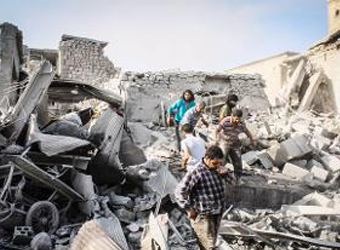Tens of thousands of Syrian civilians have fled ferocious fighting between Russian-backed regime forces and Islamic State (ISIS) militant group over the past week in the country’s ravaged north.
Supported by Russian air power and artillery, Syrian government forces have waged a fierce offensive against ISIS, seizing around 90 villages from the Islamist militants since mid-January.
Their aim, according to the Syrian Observatory for Human Rights monitoring group, is ISIS-held Khafsah, the main station pumping water into Aleppo.
Residents of Syria’s second city have been without mains water for 47 days after the Islamist militants cut the supply.
The fighting over the past week has sparked an exodus of “more than 30,000 civilians, most of them women and children,” Observatory head Rami Abdel Rahman said Saturday.
Most of the displaced went to areas around Manbij, under the control of the Syrian Democratic Forces (SDF), an alliance of Kurdish and Arab fighters backed by the United States that is also fighting ISIS, the monitor said.
An AFP correspondent in Manbij saw dozens of displaced families speeding towards the relative safety of the town on motorcycles and in small buses and cars.
Many of them looked exhausted as they lined up at a checkpoint manned by the Manbij Military Council, the SDF unit that controls the town, to be searched and get permission to enter.
Ibrahim al-Quftan, co-chair of Manbij’s civil administration, told AFP that as many as 40,000 displaced people had arrived in the town in recent days.
“The numbers of displaced people here are still rising because of the clashes between the Syrian regime and Daesh (ISIS),” Quftan said.
“These people are suffering very difficult circumstances.”
Manbij is already hosting “tens of thousands of displaced people that fled previous clashes in the area and are living in difficult circumstances,” according to Abdel Rahman.
“This will make it difficult for local authorities to welcome a new wave of displaced people, given their inability to tend to their pressing needs,” he said.
Since civil war broke out in Syria in March 2011, more than half of its pre-war population has been forced to flee their homes.
The northern province of Aleppo hosts tens of thousands of displaced Syrians, many in camps near the border with Turkey.
Rebel backer Ankara sent its own troops into Syria in August to fight IS as well as Kurdish units in an operation dubbed “Euphrates Shield.”
Turkey considers the Kurdish People’s Protection Units (YPG), which makes up most of the SDF, a “terrorist” group because of its ties to outlawed Kurdish militia in southeast Turkey.
On February 23, the Turkish-backed rebels of Euphrates Shield captured the town of Al-Bab, which had been IS’s last remaining bastion in Aleppo province.
They have since set their sights on Manbij, with Turkish Foreign Minister Mevlut Cavusoglu this week threatening to bomb YPG fighters unless they leave the town.
The Observatory on Saturday reported escalating violence and shelling between Euphrates Shield rebels and the SDF.
More than 310,000 people have been killed since Syria’s conflict broke out with protests against the rule of President Bashar al-Assad, but international efforts at stemming the violence have thus far failed.
Another round of UN-brokered peace talks ended Friday in Geneva, with the opposition and regime figures agreeing on a “clear agenda” for future diplomatic efforts.
Veteran envoy Staffan de Mistura said he hopes to invite both sides back to Geneva later this month for a new round of talks, which will include the issue of counter-terrorism at the request of Damascus and its ally Moscow.
Russia began its air war in support of Assad’s forces in September 2015, helping the Syrian army retake key territory.
Its help was instrumental in the recapture of the ancient desert city of Palmyra from IS on Wednesday, and it continued to strike Islamist militant positions north and east of the city on Saturday, the Observatory said.
The Britain-based monitor said Syrian government forces were working inside the city on Saturday to clear mines left behind by retreating ISIS fighters.
At least 115 members of pro-regime forces and 283 Islamist militants were killed in the more than month-long fight for Palmyra, which has traded hands several times in the war, the Observatory said.
Source: AFP


